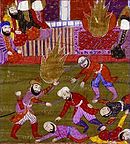Template:Pictorial-Islam-options: Difference between revisions
| [checked revision] | [checked revision] |
mNo edit summary |
mNo edit summary |
||
| Line 1: | Line 1: | ||
<noinclude>Also see: [[Template:Pictorial-Islam]]</noinclude><!-- HELP NOTES: Each option tag handles one random story --><choose> | <noinclude>Also see: [[Template:Pictorial-Islam]]</noinclude><!-- HELP NOTES: Each option tag handles one random story --><choose> | ||
<option weight="1">{{Pictorial-Islam|1=Seven Sleepers of Ephesus in the Qur'an|2=[[File:Seven sleepers.jpg|170px|link=Seven Sleepers of Ephesus in the Quran]]|3=The legend of the Seven Sleepers of Ephesus was popular in both Europe and the Middle East during medieval times. It was translated into Latin and found its way into many Christian works of that era. The author of the Qur'an even took this story written by Christians and reworked it into a polemic against Christianity. Thus it also became very prominent in the Muslim world because of its inclusion in the Qur'an. After the Renaissance and Enlightenment of the 16th century, this story fell out of favor and was largely dismissed as mythical. Since the tale is not found in the Bible, it was also rejected by the majority of the world's Christian churches without any theological consequence. The feast day for the Seven Sleepers of Ephesus is no longer observed by the Roman Catholic Church (it is now referred to within the church as a "purely imaginative romance"), and the story today is virtually unknown among the Protestant churches. Conversely, since the tale is found within the Qur'an, Islamic apologists are forced to defend the historicity of the story. ([[Seven Sleepers of Ephesus in the Quran|''read more'']])}}</option> | |||
Revision as of 11:12, 30 December 2013
Also see: Template:Pictorial-Islam
|
